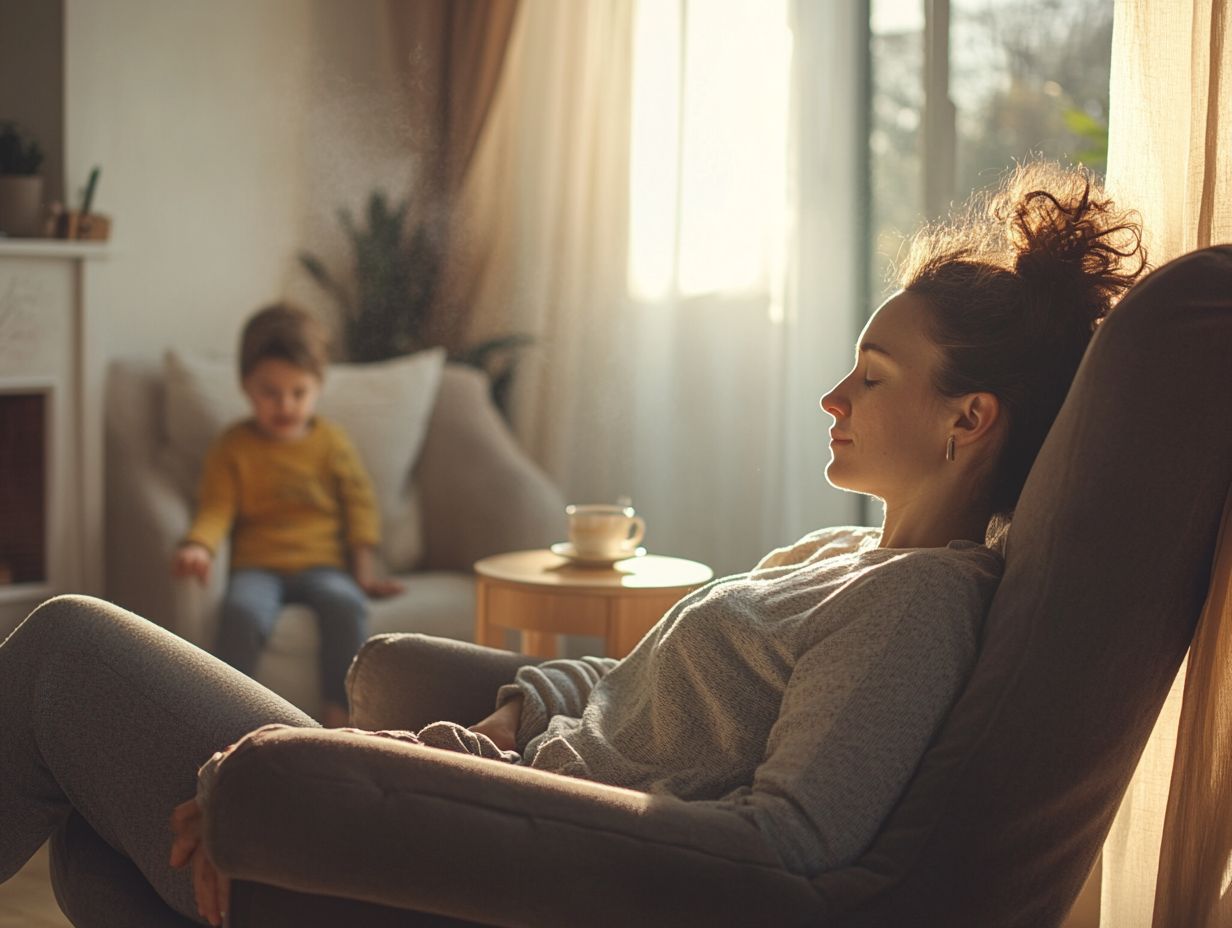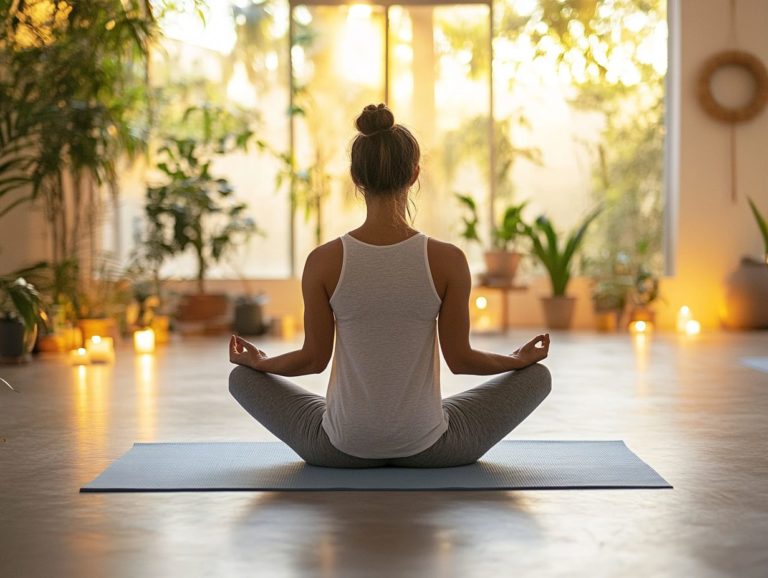5 Relaxation Techniques for Parents
Parenting can feel like a relentless storm of responsibilities and emotions, often leaving you with scant opportunities for personal relaxation.
This article offers you five effective relaxation techniques perfectly suited for busy parents:
- Deep breathing exercises
- A technique where you tense and relax muscles
- Guided imagery
- Mindfulness meditation
- Yoga or stretching
You ll find practical tips on how to weave these techniques into your routine. You ll also recognize barriers that may arise and explore ways to involve your children!
Embrace these strategies to reclaim your calm and elevate the well-being of both yourself and your family.
Contents
- Key Takeaways:
- 1. Deep Breathing Exercises
- 2. Progressive Muscle Relaxation
- 3. Guided Imagery
- 4. Mindfulness Meditation
- 5. Yoga or Stretching
- What Are the Benefits of Practicing Relaxation Techniques?
- How Can Parents Find Time for Relaxation?
- Common Barriers Parents Face in Relaxation Techniques
- How Can Parents Involve Their Children in Relaxation Techniques?
- What Are Some Additional Tips for Parents to Reduce Stress and Promote Relaxation?
- What Are the Long-Term Effects of Stress on Parents and Their Children?
- Frequently Asked Questions
- What are 5 relaxation techniques for parents?
- Why is it important for parents to practice relaxation techniques?
- How can deep breathing exercises help parents relax?
- What is progressive muscle relaxation and how can it benefit parents?
- Can guided imagery help parents with their stress levels?
- Do parents need to set aside a lot of time to practice relaxation techniques?
Key Takeaways:

- Deep breathing exercises can quickly calm the mind and body, reducing stress and promoting relaxation for busy parents.
- A technique where you tense and relax muscles can release tension and promote relaxation.
- Guided imagery, mindfulness meditation, and yoga or stretching can effectively alleviate stress and promote overall well-being.
1. Deep Breathing Exercises
Deep breathing exercises are invaluable mindfulness techniques that can significantly elevate your mental well-being and relaxation. By focusing on your breath and tuning in to your body, you can experience a profound reduction in stress and anxiety essential tools for effective parenting and overall health.
Among these techniques, focused breathing invites you to concentrate solely on your inhalations and exhalations, crafting a serene mental space. On the other hand, deep diaphragmatic breathing encourages you to engage your diaphragm fully, enhancing oxygen intake and activating your body s natural relaxation response.
Have you ever tried the 4-7-8 breathing technique? In this approach, you inhale for four counts, hold for seven, and exhale for eight. This creates an essential calming atmosphere for everyone and imparts vital coping mechanisms for managing stress from an early age!
2. Progressive Muscle Relaxation
Progressive muscle relaxation is a powerful technique that systematically reduces stress by focusing on different muscle groups while promoting mindfulness through intentional relaxation.
This method guides you to tense and then relax each muscle group, starting from your toes and moving up to your head or the other way around. By honing in on the sensations of tension and relaxation, you and your children can cultivate a deeper awareness of your bodies, fostering a profound sense of calm. For more strategies, check out the top relaxation techniques for busy professionals.
This technique offers far-reaching benefits! It alleviates anxiety, promotes better sleep, and enhances your emotional regulation. Make this practice a part of your daily routine now to unlock its benefits! Just set aside a few minutes before bedtime or after school to cultivate a positive habit.
You can even join in with your kids, turning it into a bonding activity that encourages open conversations about feelings, ultimately strengthening those valuable family connections.
3. Guided Imagery
Guided imagery is an exceptional relaxation technique that invites you to visualize peaceful and serene settings, significantly enhancing mental well-being and serving as a soothing remedy for children’s anxiety.
By immersing your mind in vivid scenarios, you can transport both yourself and your children to tranquil places, like a serene beach with gentle waves or a lush forest alive with the songs of birds. You have the power to guide your children through these calming experiences by crafting soothing narratives that foster a sense of security and comfort!
To cultivate the perfect calming environment for this practice, consider dimming the lights, playing soft music, or using essential oils to elevate the experience. In this serene space, breathing eases, and minds can truly unwind, delivering profound relief from the stresses of daily life.
4. Mindfulness Meditation

Mindfulness meditation stands as a cornerstone for your stress relief. It allows you to cultivate positive emotions while practicing mantra meditation and achieving a deeper connection with your thoughts and feelings.
This practice encompasses various techniques, such as focused breathing, which fosters awareness and presence in the moment. Doing these types of meditation can lead to significant improvements in your mental clarity and emotional stability, greatly enhancing your overall mental health.
If you’re a parent looking to introduce mindfulness into your family routine, start by dedicating just a few minutes each day to group meditation or breathing exercises with clear steps. By creating a calm environment and modeling these practices, you not only enhance your own well-being but also equip your children with invaluable coping skills for life. For additional support, consider exploring 5 relaxation techniques to alleviate anxiety.
5. Yoga or Stretching
Yoga and stretching serve as exemplary relaxation techniques. They not only enhance your physical well-being but also foster emotional balance through energy therapy. These practices are particularly beneficial for parents aiming to manage stress effectively.
By exploring various styles of yoga whether it’s the gentle flow of Hatha, the dynamic rhythm of Vinyasa, or the deep stretches of Yin you can discover activities that align perfectly with your family’s unique needs. Practicing these techniques together strengthens your family bond and cultivates a shared routine that encourages mindfulness.
Simple stretching exercises like child s pose or cat-cow further aid in releasing tension, enhancing flexibility, and promoting a serene state of mind. Embracing yoga and stretching can lead to greater mental clarity and emotional resilience, setting a positive example for the younger generations in your life.
What Are the Benefits of Practicing Relaxation Techniques?
Practicing relaxation techniques offers you a wealth of benefits, including significant reductions in stress levels, improved mental well-being, and enhanced emotional resilience especially valuable as you navigate the challenges of parenting stress.
Research has shown that these techniques can sharpen your focus, enabling you to manage daily tasks more effectively and maintain productivity. Experts advise that regularly engaging in practices like meditation and deep-breathing exercises not only aids in emotional regulation but also promotes better health outcomes, such as lower blood pressure and improved immune function.
A study published in the Journal of Health Psychology found that individuals who incorporated relaxation practices into their routines experienced fewer anxiety-related symptoms and greater life satisfaction. Start practicing relaxation techniques today! For instance, you can explore 5 ways to use visualization for relaxation, which can significantly reduce your stress and enhance your overall well-being.
How Can Parents Find Time for Relaxation?
You often find it challenging to carve out time for relaxation amidst your bustling schedule. However, by weaving brief mindfulness practices into your daily routine, you can alleviate parenting stress and enhance your overall well-being.
Consider purposefully scheduling short breaks throughout your day, even if it s just for five minutes. These little moments are vital for your self-care. Whether you step outside to breathe in fresh air or savor a quiet cup of tea, these intervals can work wonders to refresh your mind.
Involving your children in relaxation techniques, such as deep breathing exercises or guided imagery imagining peaceful scenes to promote relaxation not only sets a positive example but also nurtures a sense of connection and calm within your family. You can also embrace mindfulness during everyday activities like meal prep or laundry by focusing on the sensations and movements involved. This transforms mundane tasks into opportunities for awareness and peace. Additionally, consider exploring 5 relaxation techniques for children to enhance their well-being.
Common Barriers Parents Face in Relaxation Techniques

Common barriers to embracing relaxation techniques for parents often revolve around time constraints, overwhelming responsibilities, and the misconception that self-care is a luxury rather than a vital tool for managing parenting stress.
This mindset can evoke feelings of guilt when you carve out time for yourself.
The prevailing belief tends to be that your focus should solely be on your children. Balancing work, household duties, and extracurricular activities leaves little room for personal downtime.
To tackle these challenges, consider adopting small yet impactful strategies, such as:
- Designating just a few minutes each day for mindfulness exercises
- Practicing simple breathing techniques
Setting realistic expectations, like recognizing that it s perfectly acceptable to seek assistance from family or friends, can cultivate a supportive network that encourages essential moments of relaxation. Remember, prioritizing your mental well-being ultimately benefits not just you but your entire family as well.
How Can Parents Involve Their Children in Relaxation Techniques?
Involving your children in relaxation techniques not only cultivates a meaningful family experience but also equips them with invaluable skills for managing stress. Engaging in activities like imagining a peaceful scene and mindfulness exercises can be both enjoyable and beneficial.
Have fun with breathing exercises! Pretend to blow up a balloon or gently trace your fingers to feel your breath. Creative visualization, where they envision a serene place like a tranquil beach or a cozy forest, can ignite their imaginations while promoting relaxation. For more ideas, consider exploring 5 relaxation techniques for seniors.
By teaching these methods now, you re not just handing them tools to tackle life’s challenges; you re also nurturing their emotional intelligence, enhancing their ability to express feelings and manage anxiety as they grow.
What Are Some Additional Tips for Parents to Reduce Stress and Promote Relaxation?
To reduce stress and promote relaxation, you can adopt additional strategies like incorporating regular mindfulness practices, utilizing breathing exercises, and establishing a calming bedtime routine for your family.
These approaches can significantly enhance your overall family dynamics, making it essential to prioritize mental wellness. Consider setting clear boundaries around work and personal time, ensuring that your family moments remain uninterrupted.
Engaging your children in community resources, such as local support groups or wellness workshops, can provide extra layers of encouragement and understanding. Fostering open dialogue about emotions and stressors can create a nurturing environment, allowing every family member to express themselves freely while cultivating resilience together.
What Are the Long-Term Effects of Stress on Parents and Their Children?
Don’t wait! Recognizing stress early is crucial for a healthy family. The long-term effects of stress on both parents and their children can be profound, leading to increased risks of mental health issues, strained relationships, and adverse impacts on children’s emotional and behavioral development.
Research from the American Psychological Association reveals that unresolved stress can create a cycle of anxiety and dysfunction within families, potentially casting a shadow on future generations. Experts point out that early intervention is crucial; it addresses immediate concerns while laying the groundwork for healthier coping mechanisms.
Techniques such as mindfulness and relaxation exercises have been shown to significantly reduce stress levels, fostering a more stable environment for children. By embracing these methods, families can enhance their resilience, ultimately promoting better emotional health and enriching overall family dynamics.
Frequently Asked Questions

What are 5 relaxation techniques for parents?
- Deep breathing exercises
- Progressive muscle relaxation
- Imagining a peaceful scene
- Mindful meditation
- Yoga or stretching
Start incorporating these relaxation methods today for a happier, healthier family!
Why is it important for parents to practice relaxation techniques?
Parenting can be stressful. Over time, this stress can lead to burnout and harm a parent’s physical and mental health. By practicing relaxation techniques, parents can reduce stress and improve their overall well-being. This, in turn, can benefit their children.
How can deep breathing exercises help parents relax?
Deep breathing exercises are simple and effective. By taking slow, deep breaths, you can lower stress and calm your mind.
What is progressive muscle relaxation and how can it benefit parents?
This technique can be a game changer. It helps you learn to relax your muscles by tensing and then releasing them, which can release built-up tension throughout your body.
Can guided imagery help parents with their stress levels?
Absolutely! Guided imagery lets you escape to peaceful places in your mind, helping you relax and recharge. It can transport you away from stressors and into a serene environment.
Do parents need to set aside a lot of time to practice relaxation techniques?
You don t need hours! Just a few minutes each day can make a huge difference in your stress levels. Incorporate relaxation techniques into your daily routine, like practicing deep breathing while waiting in the carpool line or doing a quick yoga session before bed.






